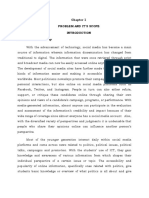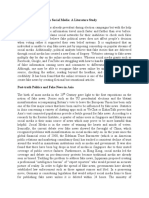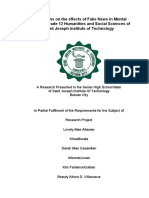Fake News
Fake News
Uploaded by
Porcia ScriptsCopyright:
Available Formats
Fake News
Fake News
Uploaded by
Porcia ScriptsOriginal Title
Copyright
Available Formats
Share this document
Did you find this document useful?
Is this content inappropriate?
Copyright:
Available Formats
Fake News
Fake News
Uploaded by
Porcia ScriptsCopyright:
Available Formats
In the age of the internet and social media, the problem of fake news has become increasingly
prevalent. Fake news refers to the spread of false information, often intentionally, through various
media channels. This essay will examine the causes and consequences of fake news, as well as potential
solutions to this growing problem.
There are several reasons why fake news is becoming more common. The first is the ease with which
information can be shared on social media platforms. With the click of a button, anyone can share a
news article or post their opinion on a topic, whether or not the information is accurate. This has led to
a proliferation of fake news stories, which can quickly spread and be shared by millions of people.
Another factor contributing to the spread of fake news is the increasing polarization of society. People
are more likely to believe information that supports their existing beliefs, and less likely to question
information that contradicts their beliefs. This makes it easier for fake news to be accepted and shared,
particularly if it confirms existing biases.
The consequences of fake news can be significant. It can lead to public confusion and mistrust of
institutions, particularly if the false information is related to politics or public health. It can also be used
to spread hate and incite violence against particular groups. In extreme cases, fake news can even lead
to physical harm or death.
To address the problem of fake news, several solutions have been proposed. One approach is to
increase media literacy, so that people are better able to distinguish between reliable and unreliable
sources of information. This can include education programs in schools, as well as public awareness
campaigns.
Another approach is to increase regulation of social media platforms. This could include policies
requiring greater transparency around the sources of information shared on social media, as well as
measures to remove false information and prevent the spread of fake news.
Finally, it is important to encourage responsible journalism and reporting. This includes holding media
outlets accountable for the accuracy of their reporting, as well as encouraging journalists to fact-check
information and report on multiple perspectives.
In conclusion, fake news is a growing problem that has significant consequences for society. While there
are no easy solutions to this problem, it is important to take steps to increase media literacy, regulate
social media platforms, and encourage responsible journalism. By working together to address the
problem of fake news, we can create a more informed and trustworthy society.
You might also like
- Navigating The Digital Landscape: Understanding The Urgent Challenges of Misinformation and Fake NewsDocument4 pagesNavigating The Digital Landscape: Understanding The Urgent Challenges of Misinformation and Fake NewsDr. Devanand C. MandrekarNo ratings yet
- Final Task Mis442Document8 pagesFinal Task Mis442humayuntamim1998No ratings yet
- Pakistan Studies Assignment#2: Social Media: A Source of Information or DisinformationDocument4 pagesPakistan Studies Assignment#2: Social Media: A Source of Information or DisinformationAbdul HaadiNo ratings yet
- Effects of Media On Society and Solutions For ItDocument6 pagesEffects of Media On Society and Solutions For ItDandityNo ratings yet
- Untitled DocumentDocument2 pagesUntitled DocumenttonylongchenNo ratings yet
- Ingles PDFDocument4 pagesIngles PDFVelk TrujNo ratings yet
- Essay 3_ the Impact of Social Media on Society Social Media Has Revolutionized the Way People Communicate and Connect With Each Other. While It Has Brought Many Benefits, Such as Increased Access to InfDocument1 pageEssay 3_ the Impact of Social Media on Society Social Media Has Revolutionized the Way People Communicate and Connect With Each Other. While It Has Brought Many Benefits, Such as Increased Access to Infkenny rogerNo ratings yet
- Shruti Shrivastava Socy AssignmentDocument5 pagesShruti Shrivastava Socy AssignmentShruti ShrivastavaNo ratings yet
- Mis Final Assignment AjijDocument6 pagesMis Final Assignment Ajijhumayuntamim1998No ratings yet
- MIL SummativeDocument3 pagesMIL SummativeHilea Jane GalesNo ratings yet
- GEC 105-Reflection PaperDocument2 pagesGEC 105-Reflection PaperFRANCISCO JERHYL KEITH G.No ratings yet
- Ajij Mis442Document7 pagesAjij Mis442humayuntamim1998No ratings yet
- The Impact of Social Media On SocietyDocument2 pagesThe Impact of Social Media On Societya40198617No ratings yet
- Health Misinformation in Social Media - To Censor or Not To CensorDocument9 pagesHealth Misinformation in Social Media - To Censor or Not To CensorsophierosedahlNo ratings yet
- Chapter 4Document10 pagesChapter 4kendallNo ratings yet
- Assignment 1 - Suhailie Binti Daud - ScribdDocument10 pagesAssignment 1 - Suhailie Binti Daud - Scribdsuhailie lilyNo ratings yet
- P07134220061 - Ni Putu Intan Maha Ayu DiyantiDocument11 pagesP07134220061 - Ni Putu Intan Maha Ayu DiyantiIntan DiyantiNo ratings yet
- The Topic The Impact of Soc...Document1 pageThe Topic The Impact of Soc...MALATHY A/P VELAYATHAM MoeNo ratings yet
- P07134220061 - Ni Putu Intan Maha Ayu Diyanti - 1B - D4Document11 pagesP07134220061 - Ni Putu Intan Maha Ayu Diyanti - 1B - D4Intan DiyantiNo ratings yet
- Inbound 9034829934368293631Document2 pagesInbound 9034829934368293631Roselle Luzano GalugaNo ratings yet
- English Essay AssignmentDocument2 pagesEnglish Essay AssignmentShuqriNo ratings yet
- The Influence of Social Media On HuDocument2 pagesThe Influence of Social Media On Huethanvelazquez91No ratings yet
- Chapter 1Document19 pagesChapter 1Timothy AtutuboNo ratings yet
- Audio ColleDocument2 pagesAudio Collemathismb10No ratings yet
- Spreading Fake News On Social MediaDocument3 pagesSpreading Fake News On Social MediaKyle DionisioNo ratings yet
- The Rise of Digital MisinformationDocument2 pagesThe Rise of Digital Misinformationmateonelan027No ratings yet
- Task 2Document1 pageTask 2Katori TachibanaNo ratings yet
- The Impact of Social Media On SocietyDocument2 pagesThe Impact of Social Media On SocietyGalih PutraNo ratings yet
- Issue Brief W ChicagoDocument12 pagesIssue Brief W Chicagoapi-742454701No ratings yet
- Impact of Social Media On Current WorldDocument6 pagesImpact of Social Media On Current WorldGowtham JayavarapuNo ratings yet
- Media Information Literacy: Quarter 4 - Week 3Document9 pagesMedia Information Literacy: Quarter 4 - Week 3kiara maeNo ratings yet
- Deputy MinisterDocument4 pagesDeputy MinisterMiraj 3rd speaker-JCPSCNo ratings yet
- DownloadDocument2 pagesDownloadThe QueenNo ratings yet
- Is Sharing Actually Caring (UWRT 150 FINAL ESSAY DRAFT)Document7 pagesIs Sharing Actually Caring (UWRT 150 FINAL ESSAY DRAFT)Hashir AdeelNo ratings yet
- EAP EssayDocument4 pagesEAP EssayGiacomoNo ratings yet
- Research PaperDocument12 pagesResearch Paperapi-534389218No ratings yet
- Social MediaDocument5 pagesSocial MediaELKANAH MATHAINo ratings yet
- Media Is The Plural Form of MediumDocument5 pagesMedia Is The Plural Form of MediumgulshanNo ratings yet
- Crime: Media and Crime MediaDocument5 pagesCrime: Media and Crime MediagulshanNo ratings yet
- Social Media Has Transformed The WaDocument1 pageSocial Media Has Transformed The Waandrei 123No ratings yet
- Purposive Communication - FINAL PROJECTDocument9 pagesPurposive Communication - FINAL PROJECTazxeeewNo ratings yet
- What Do You Consider As The Biggest Opportunity and Challenges of New Media in Your Life?Document4 pagesWhat Do You Consider As The Biggest Opportunity and Challenges of New Media in Your Life?Christian LabeNo ratings yet
- Impact of Social MediaDocument5 pagesImpact of Social Mediakikonya50No ratings yet
- Report Week 10Document5 pagesReport Week 10Another EarthNo ratings yet
- Ciriaco, Ruthchell A. - Section 1Document3 pagesCiriaco, Ruthchell A. - Section 1Ruthchell CiriacoNo ratings yet
- Pros and Cons of Social MediaDocument7 pagesPros and Cons of Social MediaRaashiNo ratings yet
- The Impact of Social Media On Human CommunicationDocument2 pagesThe Impact of Social Media On Human CommunicationdrtxypcbzslpbrbqttNo ratings yet
- Malika Zunaira IG-II - Digital WorldDocument7 pagesMalika Zunaira IG-II - Digital WorldzunairaNo ratings yet
- The Impact of Social Media On Modern CommunicationDocument4 pagesThe Impact of Social Media On Modern CommunicationazzxureNo ratings yet
- The Impact of Social Media On SocietyDocument3 pagesThe Impact of Social Media On Societyquentinfrew77No ratings yet
- 02 - Bharghav Fake News DetectionDocument49 pages02 - Bharghav Fake News DetectionDileep Kumar UllamparthiNo ratings yet
- PUBLIC SPEAKING - Midterm OutlineDocument6 pagesPUBLIC SPEAKING - Midterm OutlineTruc AnhNo ratings yet
- Final 3 Story ThesisDocument6 pagesFinal 3 Story ThesisEdwin OtienoNo ratings yet
- TopicproposaleditedDocument4 pagesTopicproposaleditedapi-302491468No ratings yet
- Impact of Social MediaDocument6 pagesImpact of Social Mediajohnwishley04No ratings yet
- Essay 17, CorrectionDocument19 pagesEssay 17, CorrectionThế Hoàng ĐặngNo ratings yet
- Argumentative Essay - Mental HealthDocument4 pagesArgumentative Essay - Mental HealthNuurul AthiyyahNo ratings yet
- Champion - Essay CompetitionDocument4 pagesChampion - Essay CompetitionFaith Ashley EsperaNo ratings yet
- Bahasa InggrisDocument2 pagesBahasa InggrisauliasawitriabadiNo ratings yet
- Vaping PDFDocument1 pageVaping PDFPorcia ScriptsNo ratings yet
- Climate Change PDFDocument1 pageClimate Change PDFPorcia ScriptsNo ratings yet
- Frog Heart PDFDocument1 pageFrog Heart PDFPorcia ScriptsNo ratings yet
- Ants PDFDocument1 pageAnts PDFPorcia ScriptsNo ratings yet
- Chatgpt PDFDocument1 pageChatgpt PDFPorcia ScriptsNo ratings yet
- Ai PDFDocument1 pageAi PDFPorcia ScriptsNo ratings yet
- In Humans PDFDocument1 pageIn Humans PDFPorcia ScriptsNo ratings yet
- MIL S2-1Q Week 2Document9 pagesMIL S2-1Q Week 2Ray CageNo ratings yet
- 4th Quarter CAPSTONEDocument30 pages4th Quarter CAPSTONEWallace RamosNo ratings yet
- Strategic Communication To Counter Security Threats in The Disinformation EraDocument11 pagesStrategic Communication To Counter Security Threats in The Disinformation EraIonutNo ratings yet
- Avaaz Response To Proposals For Initiative On Greater Transparency in Sponsored Political Content & Other Supporting MeasuresDocument15 pagesAvaaz Response To Proposals For Initiative On Greater Transparency in Sponsored Political Content & Other Supporting MeasuresCLARETNo ratings yet
- SethuDocument23 pagesSethudubenozipho05No ratings yet
- Chequeado in Argentina. Fact-Checking and The Spread of Disinformation On Social MediaDocument32 pagesChequeado in Argentina. Fact-Checking and The Spread of Disinformation On Social MediachequeadoNo ratings yet
- Exploring Ethical Considerations in Generative AiDocument5 pagesExploring Ethical Considerations in Generative AiIJAR JOURNALNo ratings yet
- CR Claims Experiment - Task 2 Guidelines - V.LFDocument22 pagesCR Claims Experiment - Task 2 Guidelines - V.LFLatifa LatifaNo ratings yet
- Digital Media Syllabus IIMCDocument44 pagesDigital Media Syllabus IIMCkkNo ratings yet
- DemoDocument9 pagesDemoLiezly Rose Saligumba, MBANo ratings yet
- IE Placement Test - Test PaperDocument8 pagesIE Placement Test - Test PaperPhan ThảoNo ratings yet
- Surgeon General Misinformation AdvisoryDocument22 pagesSurgeon General Misinformation AdvisoryEthan BiandoNo ratings yet
- Architects of Networked Disinformation Full ReportDocument82 pagesArchitects of Networked Disinformation Full ReportAmabelle Rose AbongNo ratings yet
- Finals PaperDocument21 pagesFinals PaperCzarina MangalinaoNo ratings yet
- Social Media EssaysDocument2 pagesSocial Media Essaysb71bpjha100% (2)
- Research Paper 3IDocument25 pagesResearch Paper 3ItejaresulysesNo ratings yet
- Ahelect Quiz 3 2Document1 pageAhelect Quiz 3 2andrejosefpunsalanNo ratings yet
- All The President S Lies How Brazilian News Media Addressed False and Inaccurate Claims in Their TitlesDocument19 pagesAll The President S Lies How Brazilian News Media Addressed False and Inaccurate Claims in Their TitlesLuciana MoherdauiNo ratings yet
- Post Truth EraDocument11 pagesPost Truth Eraabbasinoorulhuda25No ratings yet
- Text On Inventions by AiDocument2 pagesText On Inventions by AiAnna DudetskayaNo ratings yet
- Truth in The Age of Social MediaDocument72 pagesTruth in The Age of Social MediaLiliana MacíasNo ratings yet
- Grade 11Document51 pagesGrade 11Kristel EbradaNo ratings yet
- Department of Education: Detailed Lesson Plan For The Classroom Observation Tool English 9Document9 pagesDepartment of Education: Detailed Lesson Plan For The Classroom Observation Tool English 9Gener Bagsic Tabamo Jr.No ratings yet
- Social Media Essay by AiDocument2 pagesSocial Media Essay by AililyNo ratings yet
- Social NetworksDocument3 pagesSocial NetworksTracy MoralesNo ratings yet
- Week 3-4 RWS Parallel TestDocument4 pagesWeek 3-4 RWS Parallel TestMamuNo ratings yet
- High School Students in Pacific Southbay College Inc.Document33 pagesHigh School Students in Pacific Southbay College Inc.Rudolph Sam EspirituNo ratings yet
- Research2ndsem1 2 3 1Document22 pagesResearch2ndsem1 2 3 1Airess SuelloNo ratings yet
- Visual Mis - and Disinformation, Social Media, and DemocracyDocument24 pagesVisual Mis - and Disinformation, Social Media, and DemocracyJohn David MoncadaNo ratings yet
- Pandemic Narratives of Library and Information Centers in Baguio-BenguetDocument33 pagesPandemic Narratives of Library and Information Centers in Baguio-BenguetDaniel Jr. BalbinNo ratings yet
































































































